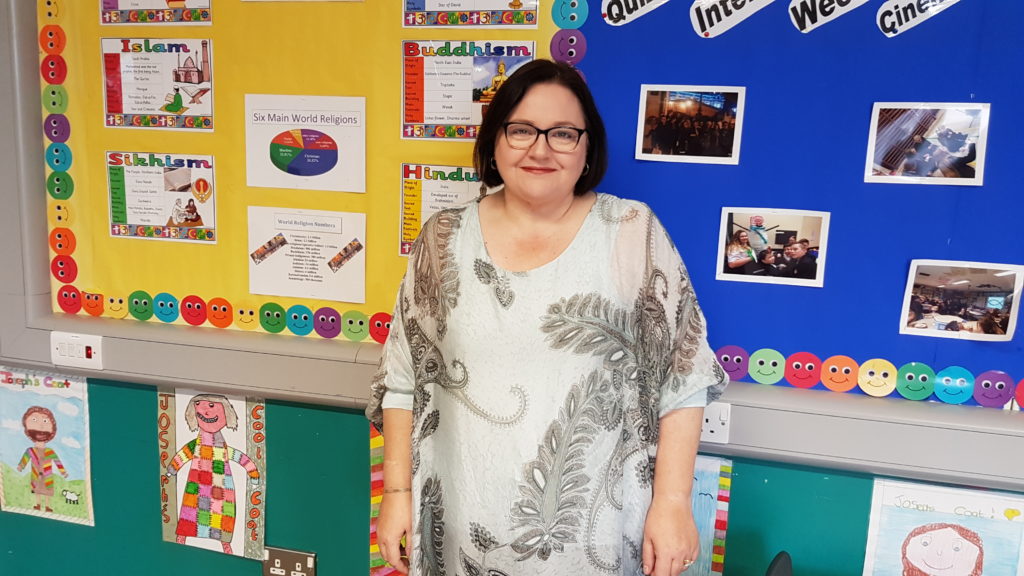Subject Info
Religious Education comprises many aspects. Students study Christianity, in both the Old and New Testament. World Religions are also studied, examining the six main world religions and relevant others. Students are also introduced to meditation to promote self-reflection, stillness and serenity.
At Key Stage 3 students lay the foundation for evaluative and critical thinking necessary for GCSE RE. GCSE students study The Gospel of Mark and Ethics.

Junior School Religious Education
Religious Education is taught to all Key Stage 3 students, (Years 8-10). Students study many different topics from the Christian background and other major world religions. In addition, Year 8 students are introduced to meditation to promote self-reflection and inner peace in a busy, technology and screen based world, this is carried on through Years 9 and 10.
Religious Education is not merely the study of ‘Religion’. It offers so much more. Students begin to develop their critical thinking and evaluative skills which are essential for GCSEs and further education. Furthermore, through the study of World Religions, students begin to broaden their horizons, examining religious and cultural practices of world faiths such as Islam, Hinduism, Christianity, Judaism, Buddhism and Sikhism. In short, students get the opportunity to both learn about and from Religious Education and the expansive topics it covers.
KS3 Topics
Year 8 Students study: The Bible, Jacob & Esau, Joseph, World Religions (Sikhism & Islam) and Meditation
Year 9 Students Study: Parables of Jesus, The Life of Moses, Events Leading to the Death of Jesus, World Religions (Judaism & Christianity) and Meditation.
Year 10 Students Study: Miracles of Jesus, The Reformation, World Religions (Buddhism and Hinduism), Corrie Ten-Boom and Meditation.
KS3 Assessments
Students are always provided a Success Criteria for assessments.
As1: A research assignment on tolerance in line with International Tolerance Day in November. Assessment is either a write up or speaking and listening assessment.
As2: Assessment Parables / Moses.
As3: Assessment on World Religions / Reformation
As4: Summer exams on all previous topics studied.
Senior School Religious Education
GCSE students study modules on both Mark’s Gospel and Christian Ethics.
Mark’s Gospel introduces students to five themes in the life and ministry of Jesus, as portrayed in Mark’s Gospel. Students enhance their knowledge and understanding of, and ability to evaluate, key passages. They will consider these passages both within the religious, political, social and cultural context of Jesus’ time, and in terms of how they influence contemporary Christian lifestyle in all its diversity.
Christian Ethics introduces students to ethics in the study of religion. Students will explore many different topics that relate to significant and important issues in our society today. Ethics is an excellent topic to help students further develop their thinking skills and personal capabilities. They further develop skills in research, debating, evaluating opinions and learn to consider the perspectives of others.
KS4 Topics
Mark’s Gospel includes: The Identity of Jesus. The Miracles of Jesus. The Teachings of Jesus, (Parables and The Kingdom of God). The Suffering and Death of Jesus. And Christian Discipleship.
Christian Ethics includes: Personal and Family Issues. Matters of Life and Death. Developments in Bio Ethics. Contemporary Issues in Christianity, and Modern warfare.
KS4 Assessments
All Key Stage 4 internal assessments are based on GCSE exam modules.
External Exams (CCEA)
Year 11: Marks Gospel (50% of GCSE)
Year 12: Ethics (50% of GCSE)
Careers In Religious Education
Many professions have ethical considerations. The study of ethics at GCSE is an excellent preparation for further study at higher levels of education.
For example: Medicine, Nursing, Social Work, Accountancy, Teaching, Youth Work, Counsellors, Religious Clergy and Journalism.
